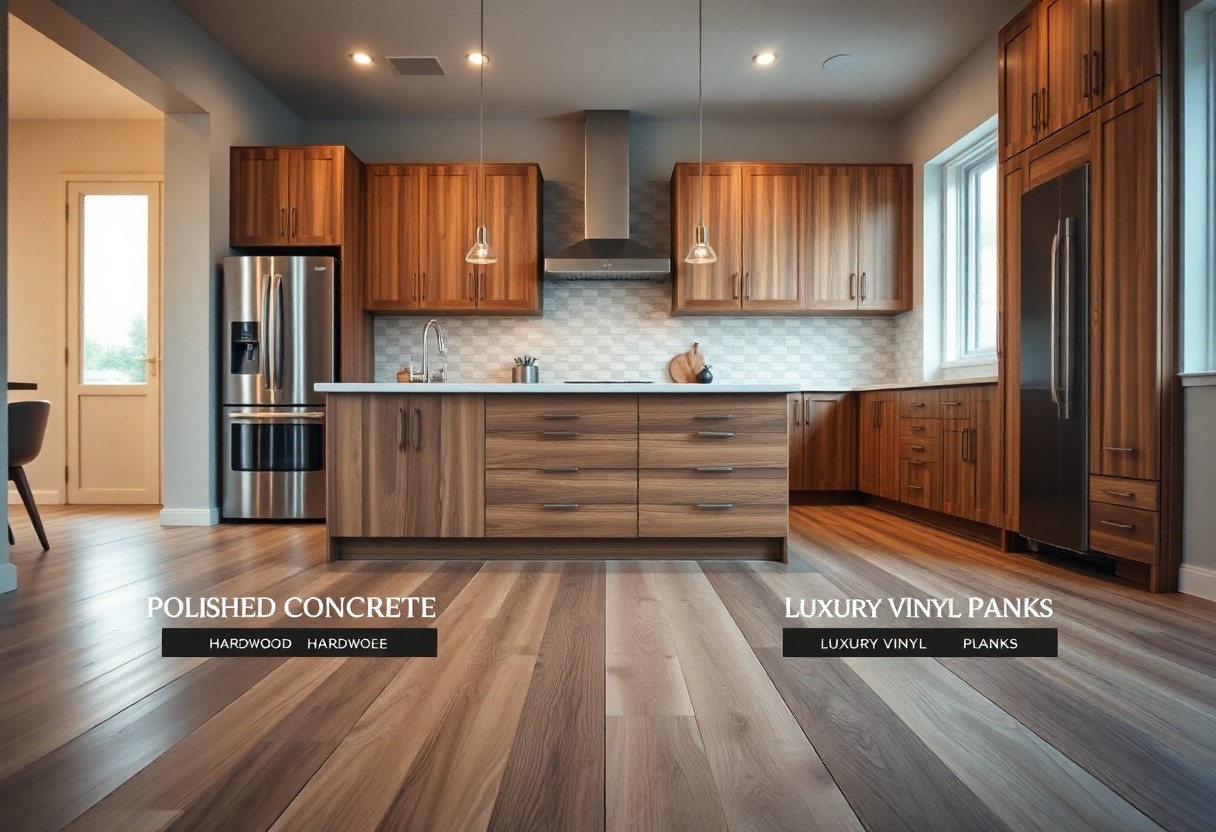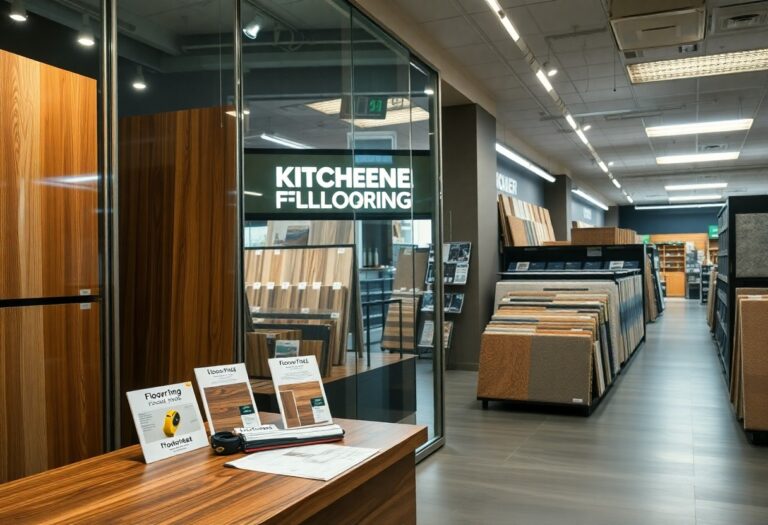Just understanding the options available can simplify your decision-making process when selecting flooring for your Kitchener home or business. With various materials, styles, and prices, you need to consider your specific needs, including durability, maintenance, and aesthetic appeal. This guide will help you evaluate your choices and ensure you select flooring that enhances your space while meeting functional requirements.

Identifying Your Space’s Functional Needs
Assessing your space’s functional needs is vital to ensure the flooring you choose meets daily demands. Consider how the area will be used and the specific activities that will take place there. For example, kitchens require durable, moisture-resistant options, while offices may prioritize comfort and acoustics. Understanding these requirements will help you narrow down your choices effectively.
Evaluating High-Traffic Areas
High-traffic areas, such as entryways and kitchens, require flooring that can withstand constant use without showing wear and tear. Options like ceramic tile, luxury vinyl, or high-quality laminate flooring are ideal, as they offer durability, ease of maintenance, and resistance to scratches and stains. Prioritize materials that not only hold up well but also provide safety features, like slip resistance.
Considering Aesthetic Preferences and Ambience
Your flooring should complement the overall aesthetic of your home or business space, reflecting your style and enhancing the ambience. From contemporary minimalist designs to rustic wood finishes, the right flooring can set the tone for the environment. For example, light-colored wood or tile can create a spacious feeling, while rich, dark tones can evoke warmth and coziness. Integrating colors and textures that align with your vision will lead to a cohesive look throughout your space.
Focusing on aesthetic preferences involves more than just color choices; consider texture and patterns that enhance the visual appeal. Incorporating different materials can create unique focal points, like adding a patterned rug over hardwood or blending tile styles in a backsplash. You might also explore eco-friendly options that provide both beauty and sustainability, such as bamboo or cork, which can contribute to a tranquil and inviting atmosphere while ensuring durability and low maintenance in high-use areas.
Weighing Material Choices and Their Performance
Every flooring material has distinct characteristics, impacting performance, cost, and aesthetic appeal. By evaluating options like hardwood, tile, vinyl, and laminate, you can identify which fits your lifestyle and space. Each material offers unique advantages and disadvantages, so a thorough comparison will guide you toward a suitable choice tailored to your needs.
Comparing Durability and Maintenance Requirements
Durability and Maintenance Comparison
| Material | Durability | Maintenance |
| Hardwood | Durable with scratches | Requires regular refinishing |
| Tile | Highly durable, water-resistant | Easy to clean, infrequent upkeep |
| Vinyl | Resistant to wear and fading | Simple cleaning, low maintenance |
| Laminate | Good durability but susceptible to moisture | Easy to clean, replacement needed if damaged |
Exploring Eco-Friendly and Sustainable Options
Eco-friendly flooring choices play a significant role in sustainable building practices. Materials like bamboo, reclaimed wood, and cork not only reduce environmental impact but also offer unique aesthetics. By choosing products certified by organizations such as the Forest Stewardship Council (FSC), you support responsible forestry and sustainable harvesting methods.
Bamboo is a rapidly renewable resource that grows quickly without the need for pesticides. Reclaimed wood adds character while conserving resources, and cork is harvested without harming the tree, making it a sustainable option. These materials enhance indoor air quality, are biodegradable, and contribute to healthier living environments, benefiting both you and the planet.
Financial Realities: Budgeting for Flooring Choices
Budgeting for flooring is vital to ensure your vision aligns with your financial capacity. Consider not only the initial purchase price of materials but also additional costs like underlayment, transitions, and any necessary subfloor repairs. Setting a budget that incorporates these elements allows you to make informed choices without overspending or compromising quality.
Understanding Cost Implications of Different Materials
The cost implications of flooring materials vary significantly. For instance, hardwood may cost between $5 to $10 per square foot, while laminate options can start as low as $1 per square foot. Luxury vinyl falls in the middle, with pricing around $2 to $6 per square foot. Assessing your priorities between aesthetic appeal, durability, and maintenance can guide you towards the best financial decision.
Navigating Installation and Long-Term Maintenance Expenses
Installation and long-term maintenance can significantly impact your overall flooring budget. Professional installation may range from $1 to $3 per square foot depending on the complexity and material. Additionally, consider future expenses like cleaning products, repairs, or refinishing services, especially for materials like hardwood that may require more upkeep over time.
For example, professional carpet installation usually incurs a cost of about $2 to $4 per square foot, but it also requires periodic steam cleaning and eventual replacement every 5 to 15 years, adding to your total investment. In contrast, vinyl flooring may have a higher initial cost but generally requires less maintenance and can last over 20 years with basic care. Balancing initial installation costs with long-term sustainability will lead to more strategic spending on your flooring project.
The Local Climate’s Impact on Flooring Decisions
Your choice of flooring should reflect Kitchener’s local climate, where seasonal changes significantly affect temperature and humidity levels. In colder months, materials with good insulation can help maintain warmth, while in summer, you might prioritize flooring that stays cool underfoot. Understanding these factors ensures that your flooring performs well year-round, enhancing durability and comfort.
Adapting to Seasonal Changes and Temperature Variability
Seasonal temperature fluctuations in Kitchener can lead to expansion and contraction of flooring materials. Flooring like engineered hardwood or luxury vinyl plank adapts better to these changes compared to solid hardwood. Selecting the right material can prevent warping and maintain appearance throughout the year.
Flooring Alternatives for Seasonal Stability
| Material | Characteristics |
| Engineered Hardwood | Less prone to warping; adaptable to moisture and temperature changes |
| Laminates | Durable, moisture-resistant, and cost-effective |
| Luxury Vinyl Plank | Waterproof, stable, and easy to maintain |
Mitigating Humidity and Moisture Concerns
Humidity levels can impact flooring, particularly in kitchens and bathrooms. Choosing water-resistant or moisture-proof materials can combat potential damage while promoting hygiene and safety. This is especially relevant in Kitchener, where seasonal humidity peaks can lead to mold and mildew issues.
Investing in waterproof flooring options like luxury vinyl or tile can provide excellent protection against humidity. Additionally, using area rugs and dehumidifiers can help manage moisture in the air, ensuring that your flooring remains pristine. Regular maintenance and sealing can further enhance the longevity of your flooring, making it a wise choice in Kitchener’s diverse climate conditions. Select materials designed to withstand such moisture while providing comfort and aesthetic appeal in your home or business.
Engaging Professional Expertise: When to Seek Help
With the variety of flooring options available, engaging professional expertise can streamline your decision-making process. Professionals can provide insights into materials suited for your specific needs and installation requirements, ensuring you avoid common pitfalls. They can offer a personalized consultation that considers both aesthetic desires and practical functionalities, ultimately guiding you toward a successful flooring choice that enhances your property value.
Knowing When to Consult a Flooring Specialist
Consult a flooring specialist when navigating complex aspects such as moisture levels, structural integrity, or when matching flooring to existing design elements is critical. Their extensive knowledge can help you identify potential issues before they arise, especially if your property has unique characteristics or demands that are not typically addressed in standard guidelines.
Leveraging Local Resources and Recommendations
Utilize local resources and recommendations for reliable flooring specialists or retailers. Community forums, social media groups, and local home improvement stores often provide valuable insights and reviews from homeowners who have recently undertaken similar projects.
Local resources can significantly enhance your flooring selection process. For example, Kitchener’s home improvement stores often feature staff with extensive knowledge about trends and products popular in the area. Online community forums, like those on Facebook or Houzz, allow you to engage directly with local homeowners who can share their experiences and recommend trustworthy professionals. Additionally, local builders or contractors may have established relationships with suppliers, offering you access to exclusive products or deals that suit your flooring needs. Leveraging these local connections ensures you’re well-informed and guided by those familiar with Kitchener’s unique home and business environments.
Conclusion
Conclusively, selecting the appropriate flooring for your Kitchener home or business involves evaluating factors such as durability, maintenance, aesthetics, and budget. Consider your specific needs and the environment where the flooring will be installed, ensuring it complements your design vision while standing up to daily wear. Whether you choose hardwood, laminate, tile, or vinyl, prioritizing quality and practicality will enhance both comfort and functionality in your space. By making an informed decision, you can enjoy a beautiful flooring solution that meets the demands of your lifestyle or business operations.





